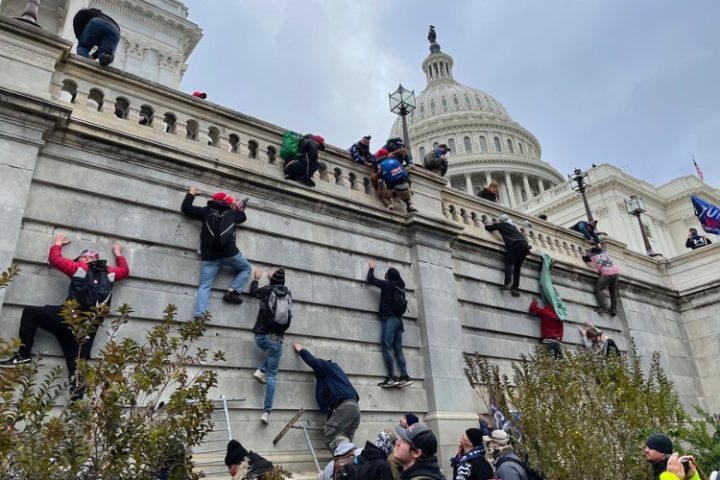
The January 6 Capitol event’s overwrought news coverage (“It’s like Pearl Harbor!”) has been called many things that it is, from hypocritical to politically expedient to demagogic to deceitful to just plain dumb. But it’s also something else: insulting and offensive — and reflective of snobbish, pseudo-elite priorities.
Addressing this Thursday, American Thinker’s Sarah Lilly writes:
Pardon, but why should I now be outraged by violence when it was celebrated by the same news media only a few months ago? Isn’t rioting the language of the unheard? Why must I mourn the loss of life on Jan. 6 more than that of David Dorn or Oscar Lee Stalwart, Jr. (the man burned beyond recognition in a Minneapolis pawn shop)? Why is the Jan. 6 riot wrong, but burning a Wendy’s to the ground is a befitting form of “social justice“?
Professional a[**]-hat Joe Scarborough said, “I’m not going to confuse a taco stand with the United States Capitol.” Why? Why is the Capitol Building more important than the taco stand? Scarborough says the Capitol building is the “center of American democracy.” Given the dichotomy between Congress’s policy priorities and the public’s, the accuracy of that representation of democracy is debatable.
Scarborough’s attitude isn’t uncommon among pseudo-elites (and leftists in general). Not only is it easy being idealistic when you don’t have to live with your ideals, but the truly “privileged” — the leftist establishment — is perfectly content having one set of standards for themselves and another for the “peons.”
A prime example was when former ESPN reporter Chris Palmer tweeted a picture of a burning building last year and wrote, “Burn that s*** down. Burn it all down,” but changed his tune when violent leftist rioters visited his streets mere days later. “Get these animals TF out of my neighborhood,” he then tweeted. “Go back to where you live.”
The burning building in Palmer’s picture was, by the way, an affordable-housing development under construction.
Returning to Scarborough’s statement, Lilly also writes, “Why is the Capitol Building worthy of more grieving than the taco stand? The affairs that take place inside the Capitol are certainly more influential in public life than the taco stand … but not in a good way.”
“Does the taco stand condemn our sons to death in the Middle East?” she continued. “Does the taco stand bomb civilians in faraway lands? Does the taco stand create economic policy that reduces one’s ability to work in a taco stand? Does the taco stand create regulations that make everyday items more expensive for the average civilian? No, on all accounts.”
Of course, while people should ideally have respect for their institutions, including our Congress, this becomes less likely when those occupying the institutions aren’t respectable. And a prerequisite for respectability is respect going both ways, with those entrusted with power accepting that they’re public servants, not the public’s masters.
Yet what attitude is reflected when politicians get exercised at the royal palace’s walls’ breaching after having treated a months-long rape of the countryside as inconsequential?
There simply is no comparison between the damage wrought by the past year’s approximately 600 violent left-wing riots and the one Capitol event. Deaths occurred during both, but many more during the former. And almost all the deaths at the Capitol appear to have been medical emergencies; the exception was Trump supporter Ashli Babbitt — who was shot by a police officer.
Aside from this, there was a bit of broken glass and a holdup in formalizing Joe Biden’s “victory” (as some call it), which, admittedly, could have delayed many senators’ dinner plans. But they all emerged unscathed, able to continue their lives of power, pocketbook, privilege, pomp, and perks.
Not so for the “commoners” affected by the left-wing riots many politicians stoked and/or winked at. Literally thousands of businesses nationwide were looted and sometimes burned/destroyed, as Americans suffered billions in damages.
A good example was 69-year-old Lucy Hosley, whose Deli in my old Bronx neighborhood was ravaged last year. She had some choice words for the thugs responsible, too (video below).
I’ve no idea what kind of insurance, if any, Hosley had or if she was ever made whole. I do know that she didn’t go back to the kind of life Senate Minority Leader Mitch McConnell (R-Ky.) or Representative Alexandria Ocasio-Cortez (D-N.Y.) enjoys.
This would be the Ocasio-Cortez who stated in 2019 that “marginalized” people have “no choice but to riot” to combat “injustice” and who said last year that the “whole point of protesting is to make ppl uncomfortable.”
It’s the same Ocasio-Cortez who wouldn’t condemn a violent 2020 Antifa attack on an ICE facility (video below).
Yet it’s also the same Ocasio-Cortez who nonetheless had the nerve to pout, quite publicly, about her January 6 “trauma” — even though she wasn’t actually in the Capitol building during its breaching. Somehow the word “narcissist” comes to mind.
As I pointed out last year in “Violence, Inc. A Leftist Enterprise,” the New York socialist isn’t alone; she was just one of many prominent Democrats whose riot responses ranged from tolerant denial to wink-and-nod encouragement to open endorsement. I also don’t care whether, as became the main point of contention, Ocasio-Cortez “exaggerated” her Capitol “trauma.” (Hey, my toothache is always worse than your toothache, ya’ know?) The point, rather, is about one of leftists’ favorite words: offensiveness.
While I generally dislike using that term, it is perhaps appropriate here to say that complaining about January 6 after being indifferent (at best) to the pain caused to millions of powerless countrymen by riotous miscreants is outrageously offensive. When it’s not driven by demagoguery, it’s the epitome of a pseudo-elite, let-them-eat-cake attitude.
The Godzilla that too many leaders birthed and which immolated swaths of America finally, ever-so-slightly, brushed them. Should Main Street cry them a river?



